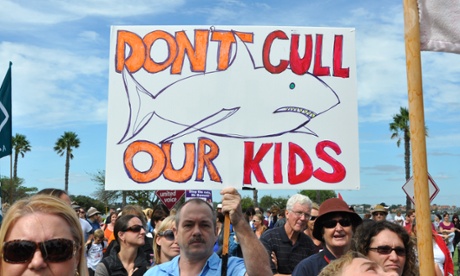Labor and the Greens seek to highlight weakening of the Gonski reforms before WA Senate election rerun

Striking teachers, parents and students bring Perth's CBD to a standstill on Tuesday.Western Australia and Northern Territory – two beneficiaries of the Abbott government’s “no strings” school funding deal – have been unable to say how much of the extra money will flow into classrooms this year.
Labor and the Greens have sought to highlight the weakening of the Gillard government-initiated Gonski reforms before the WA Senate election rerun this Saturday.
The federal education minister, Christopher Pyne, has countered by declaring that the Abbott government restored $1.2bn in previously budgeted funding over four years to WA, NT and Queensland – the three conservative-led jurisdictions that did not sign up to the Labor offers before the September election.
But the Coalition’s “no strings” funding deals have left uncertainty over the amount of money to be distributed to schools this year, and the methods used to divvy up the funding.
The office of the NT education minister, Peter Chandler, said the territory had received $35.4m additional funding from the federal government this year.
When asked how much of this money would be spent on the provision of school education, and how much would be spent elsewhere, Chandler’s spokesman told Guardian Australia: “This is subject to budget cabinet deliberations which will be tabled by the treasurer in May 2014.”
Pressed on whether the government would follow a needs-based arrangement similar to the Gonski-recommended loadings for distributing the funding, the spokesman said this too remained a matter for cabinet talks.
In WA,
where teachers and education assistants took part in a strike on Tuesday, the state government was also unable to provide clarity on spending in 2014, the first of the four years of new funding. But the government flagged a new distribution system to take effect next year. The WA education minister, Peter Collier, said the $120m extra flowing from the commonwealth over the four-year budget period would “be spent in the education sector”.
In a written response to questions, Collier said the WA government supported the principles of an equity-based student funding model for schools as proposed by the Gonski review. “From the start of 2015, all funds for WA public schools, including any additional funds from the Australian government, will be allocated using the student-centred funding model that the state government announced last year,” he said.
The government’s previously announced changes included cuts to about 500 education positions, including education assistants. But Collier said the number of teachers was the same as last year. Decisions about the level of funding would continue to be made as part of the state budget process, he said.
Labor, the Greens and public education advocates said the problem with the Abbott government’s approach was that it would not require states and territories to co-contribute and grow their existing spending on schools in return for the extra federal funding. This was unlike the deals Labor struck with other jurisdictions before the election.
The opposition education spokeswoman, Kate Ellis, said it made no sense for the federal government to be writing blank cheques for states and territories at the same time as the the treasurer, Joe Hockey, warned of a painful budget.
“The crux of the Gonski reforms was to change our broken school funding system so more money reaches the schools and students that need it most – but in Western Australia and the Northern Territory, parents, teachers and students have been kept in the dark,” she said.
In a letter to the WA education minister in December, Pyne simply requested the state not to cut funding. “Given our joint commitment to addressing student need and improving educational outcomes for all students, it is my expectation that your government would continue its funding effort across schools in Western Australia through the forward estimates period,” Pyne told Collier in the letter, seen by Guardian Australia.
The Australian Education Union’s federal president, Angelo Gavrielatos, said he could not see any federal-government-imposed barriers that would prevent states from cutting their education funding while receiving the extra federal cash. “These resources are intended for the current cohort of children, this year,” he said.
“Both the Northern Territory and the Western Australian governments are denying the current cohort of children education funding … In Western Australia and Northern Territory we are seeing cuts, not investment.”
Chandler’s spokesman said the NT government’s changes to the school staffing formula this year had identified 35 fewer teaching positions for schools, but early childhood received a boost with 63 additional teaching positions in transition, year 1 and year 2.
Collier said the WA government looked forward to working with the commonwealth “to repeal or amend the Australian Education Act 2013 to remove the ‘command and control’ aspects of the legislation”.
continue

 Forum
Forum

 Home
Home 

 Album
Album 

 Help
Help

 Search
Search

 Recent
Recent 

 Rules
Rules 

 Login
Login

 Register
Register





 Pages: 1
Pages: 1

